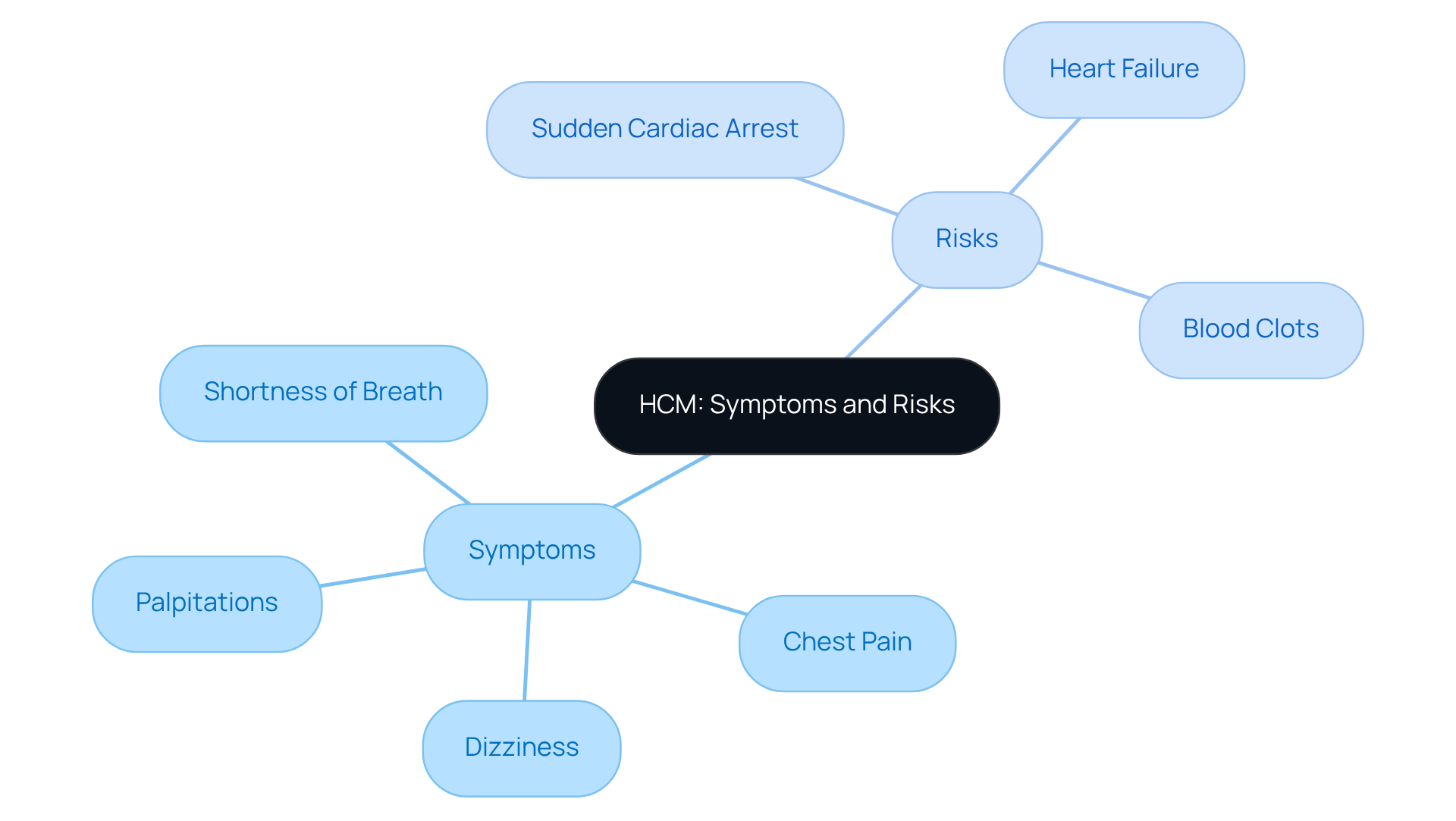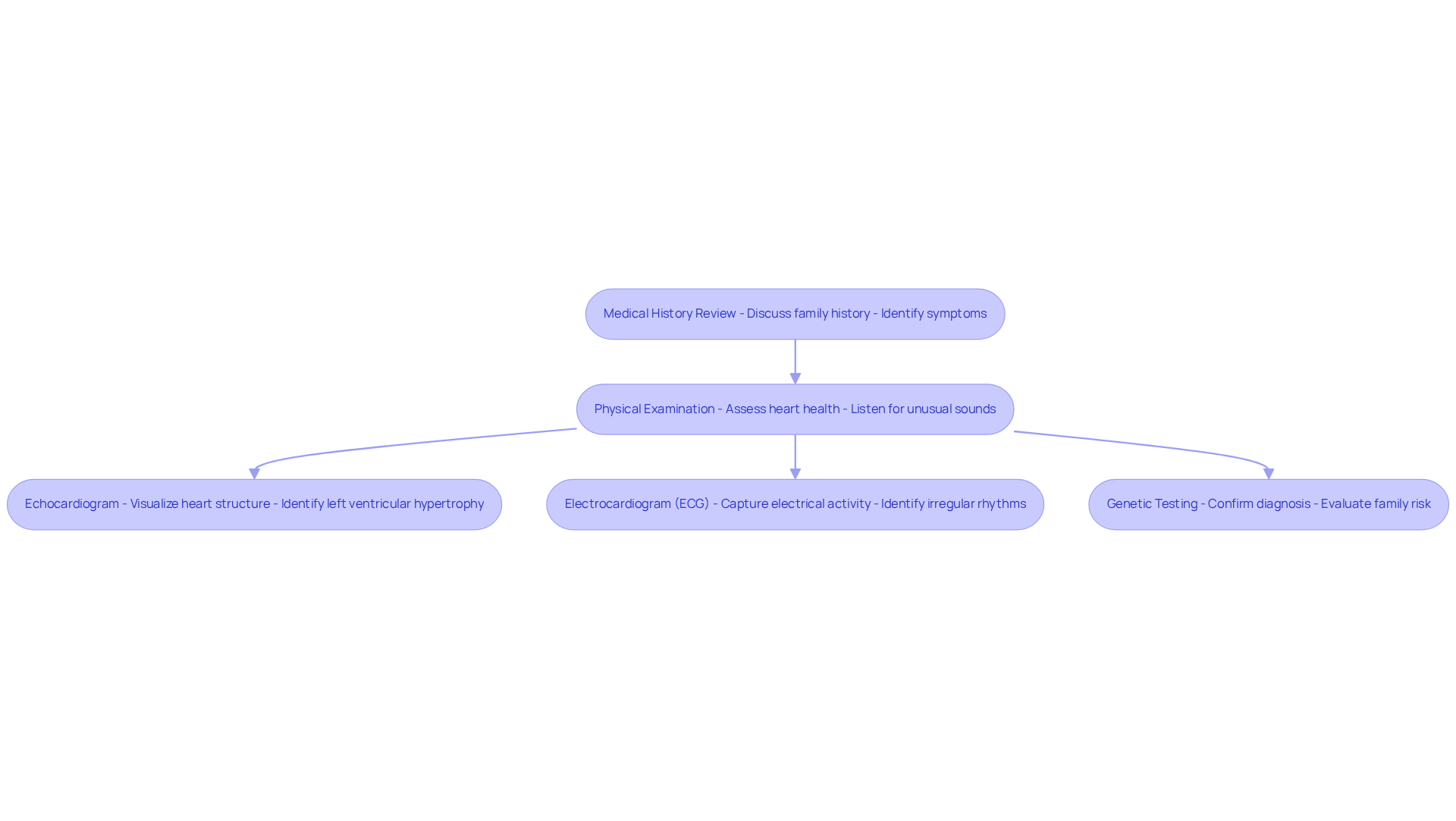


Hypertrophic Cardiomyopathy (HCM) is a hereditary heart condition that can deeply concern patients and their families. It is characterized by the thickening of the heart muscle, which may obstruct blood flow and lead to serious complications, such as heart failure and arrhythmias. Recognizing symptoms, such as shortness of breath and chest pain, is crucial for early intervention.
Accurate diagnosis is essential and typically involves a thorough medical history and imaging tests. Understanding your health is the first step towards managing HCM effectively. There are personalized treatment options available, including lifestyle changes and medications like Mavacamten, which can significantly improve patient outcomes.
If you or a loved one is experiencing symptoms of HCM, it’s important to seek help. Remember, you are not alone in this journey, and support is available to guide you through every step. Together, we can work towards a healthier future.
Hypertrophic Cardiomyopathy (HCM) is a condition that often lurks in the shadows, silently affecting the hearts of approximately 1 in 500 individuals, particularly among older adults. This hereditary disorder, characterized by the abnormal thickening of the heart muscle, can lead to serious complications such as heart failure and sudden cardiac events. Understanding the symptoms, diagnosis, and treatment options for HCM is crucial for individuals and families navigating this complex health challenge. How can one effectively identify the signs of HCM and ensure timely intervention to mitigate its risks?
In addition to this, recognizing the symptoms early can make a significant difference in managing HCM. It's important to be aware of potential signs such as:
If you or a loved one is experiencing these symptoms, please do not hesitate to seek medical advice. Remember, you are not alone in this journey—there are resources and support available to guide you through the process of diagnosis and treatment.
Furthermore, connecting with healthcare professionals who understand your concerns can provide the reassurance and care you need. By taking proactive steps, you can better navigate the complexities of HCM and prioritize your heart health. Together, we can work towards a healthier future.
Hypertrophic Cardiomyopathy (HCM), often referred to as an hcm heart condition, is a hereditary concern, especially for individuals facing health challenges. It is characterized by an unusual thickening of the heart muscle, especially in the ventricles. This thickening can obstruct blood flow, potentially leading to serious complications such as heart failure and arrhythmias. HCM affects approximately 1 in 500 individuals, and although it can present at any age, it is particularly worrisome for older adults. Signs of HCM, such as shortness of breath, chest pain, and palpitations, can significantly impact one's quality of life.
Recent research highlights the role of myosin inhibitors, like Mavacamten, in treating obstructive HCM. These treatments show promise in alleviating symptoms and improving outcomes for individuals affected by this condition. It's important to recognize that genetic factors play a crucial role in HCM, with many individuals having a family history of the condition. Understanding the HCM heart condition is vital for recognizing its risks and the necessity for , especially for older populations who may be at greater risk for sudden cardiac events.
Real-world examples of diagnosis and treatment underscore the importance of comprehensive care strategies tailored to the specific needs of individuals. If you or a loved one are experiencing symptoms, please consider reaching out for support. You are not alone in this journey, and there are resources available to help you navigate your health concerns with compassion and care.

Symptoms of the hcm heart condition can vary among individuals, especially in older adults. Common signs to be aware of include:
It's important to note that elderly patients may exhibit atypical symptoms, often misattributing these to normal aging processes. This misunderstanding can lead to delayed diagnosis, which is concerning given that the HCM heart condition poses significant risks, including sudden cardiac arrest, heart failure, and the potential for blood clots due to turbulent blood flow. Recent research indicates that many older individuals with the hcm heart condition may face serious issues, yet only a small portion are identified. This highlights the necessity for increased awareness among healthcare professionals and individuals alike.
At Amavita Heart and Vascular Health, we understand the critical need for targeted cardiovascular care for high-risk patients, including those with diabetes, hypertension, or inconclusive testing. Our advanced imaging capabilities and thorough evaluations ensure that issues are accurately assessed and managed. As Dr. Eric Popjes insightfully states, "Unfortunately, one of the presenting signs of this disease is sudden death." Recognizing these indicators and related risks is vital for ensuring prompt diagnosis and effective treatment of the hcm heart condition, ultimately enhancing outcomes for those affected.
Through our , which serves as a clinical force multiplier for internal medicine physicians, we aim to enhance cardiac care, reduce readmissions, and provide personalized strategies for managing cardiovascular conditions. Our goal is to ensure that elderly individuals receive the comprehensive care they deserve, fostering a supportive environment where their health concerns are addressed with compassion and understanding.

Diagnosing Hypertrophic Cardiomyopathy (HCM) involves a systematic approach that includes several key steps designed to support you and your loved ones through this process:
Medical History Review: Your physician will start by reviewing your family history, as HCM is often inherited. They will also discuss any symptoms you may be experiencing, such as shortness of breath or chest pain, to ensure your concerns are fully understood.
Physical Examination: A thorough physical assessment can reveal important indicators of HCM. This may include listening for unusual sounds that could suggest thickened cardiac walls, helping to paint a clearer picture of your heart health.
Recent advancements in imaging techniques, particularly cardiac MRI, have greatly improved our ability to detect subtle abnormalities in heart structure and function. This means a more comprehensive assessment of HCM is possible, which can be reassuring for you and your family. Experts emphasize the importance of a multidisciplinary approach, where specialists in cardiac imaging, genetics, and electrophysiology work together to ensure accurate diagnosis and optimal management.
Real-world examples illustrate the effectiveness of these diagnostic tests. For instance, individuals with a family history of HCM may have regular screenings, including echocardiograms, to check for any signs of the condition. This proactive approach can lead to early detection and intervention, significantly enhancing outcomes for individuals like you.
Understanding these diagnostic steps equips you and your family with the knowledge needed for consultations and related to the HCM heart condition. This ultimately promotes a more informed and involved strategy for managing HCM, ensuring that you feel supported every step of the way.

Management for the hcm heart condition is tailored to each individual's needs, considering the severity of their condition and the specific symptoms they experience. It’s important to understand the options available to you, and how they can make a difference in your life. Here are some key approaches to consider:
Recent advancements in pharmacological treatments for the hcm heart condition include beta-blockers and calcium channel blockers, which can effectively manage symptoms and help lower your pulse rate. Additionally, mavacamten is a novel medication that has shown significant promise in improving clinical outcomes for the hcm heart condition by reducing NT-pro-BNP levels and enhancing peak oxygen consumption, offering hope for better management of your condition.
It’s essential to remember that each treatment approach should be personalized, taking into account your overall health, age, and preferences. Engaging in open discussions with your healthcare provider about these options is crucial for effective management of the hcm heart condition. You deserve compassionate care and support tailored to your unique situation, ensuring you feel valued and understood every step of the way.

Hypertrophic Cardiomyopathy (HCM) is a serious heart condition characterized by the abnormal thickening of the heart muscle, which can lead to significant health risks such as heart failure and arrhythmias. Understanding HCM is crucial for timely diagnosis and treatment, especially for those at higher risk, such as older adults and individuals with a family history of the condition. Recognizing symptoms like shortness of breath, chest pain, and palpitations is essential for seeking appropriate medical care.
Throughout this article, we’ve explored key insights into HCM, including its symptoms, risks, diagnostic processes, and treatment options. The importance of early detection cannot be overstated, as many individuals may remain undiagnosed despite exhibiting symptoms. Advancements in treatment, from lifestyle modifications to innovative medications and surgical interventions, offer hope for effectively managing this condition. Engaging in open discussions with healthcare providers about personalized care strategies is vital for improving outcomes and enhancing the quality of life for those affected by HCM.
The significance of awareness and education surrounding Hypertrophic Cardiomyopathy extends beyond individual health; it fosters a community of support and understanding. For anyone experiencing symptoms or concerned about their heart health, proactive steps should be taken to seek medical advice and appropriate testing. By prioritizing cardiovascular health and embracing available resources, individuals can navigate the complexities of HCM with confidence and care, ultimately leading to better management and improved well-being.
What is Hypertrophic Cardiomyopathy (HCM)?
Hypertrophic Cardiomyopathy (HCM) is a hereditary heart condition characterized by an unusual thickening of the heart muscle, particularly in the ventricles, which can obstruct blood flow and lead to serious complications like heart failure and arrhythmias.
How common is HCM?
HCM affects approximately 1 in 500 individuals.
At what age can HCM present itself?
HCM can present at any age, but it is particularly concerning for older adults.
What are the common symptoms of HCM?
Common symptoms of HCM include shortness of breath, chest pain, and palpitations.
What recent research has been conducted regarding HCM treatment?
Recent research highlights the role of myosin inhibitors, such as Mavacamten, in treating obstructive HCM, showing promise in alleviating symptoms and improving outcomes for affected individuals.
How do genetic factors relate to HCM?
Genetic factors play a crucial role in HCM, with many individuals having a family history of the condition.
Why is understanding HCM important?
Understanding HCM is vital for recognizing its risks and the necessity for timely intervention, especially for older populations who may be at greater risk for sudden cardiac events.
What should individuals experiencing symptoms of HCM do?
Individuals experiencing symptoms should consider reaching out for support, as there are resources available to help navigate health concerns with compassion and care.